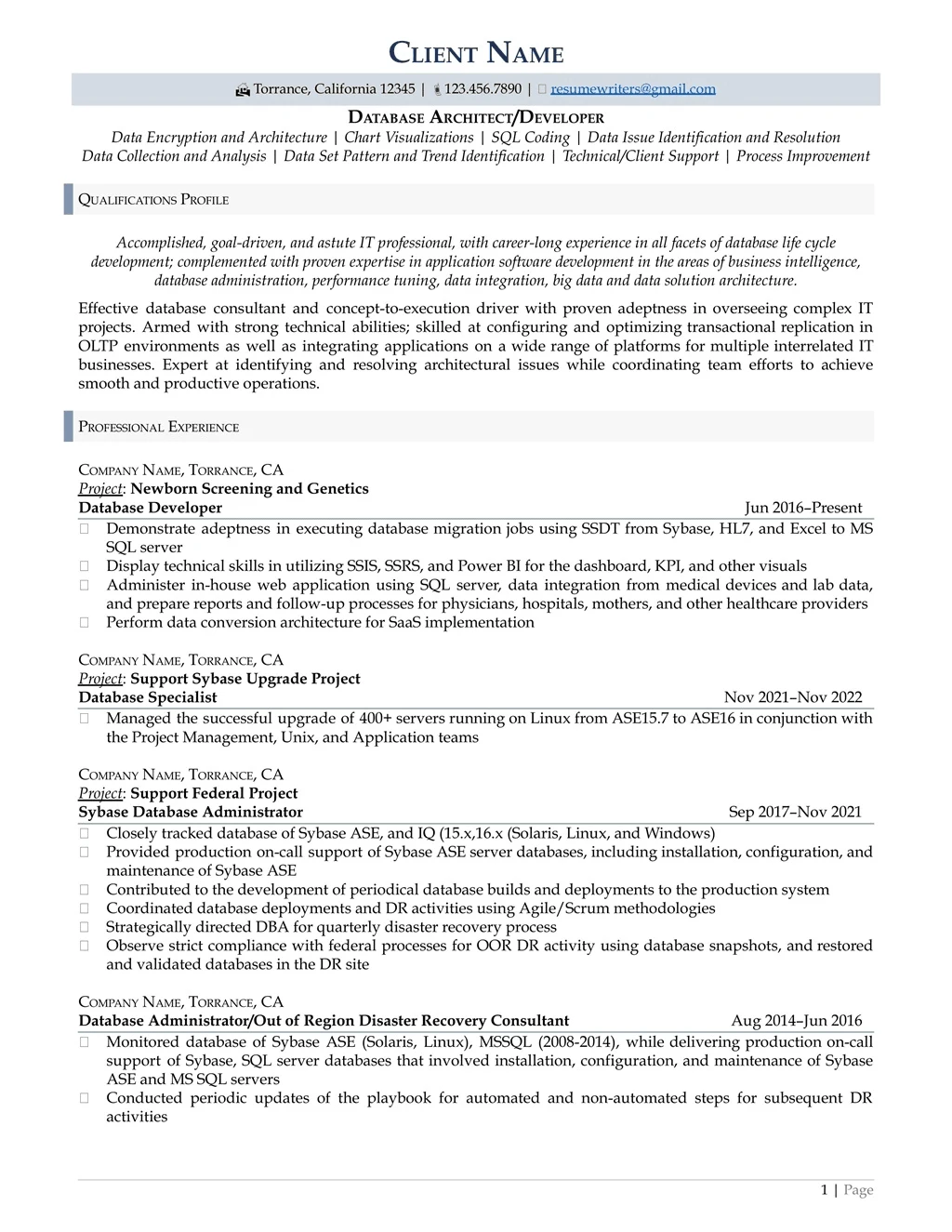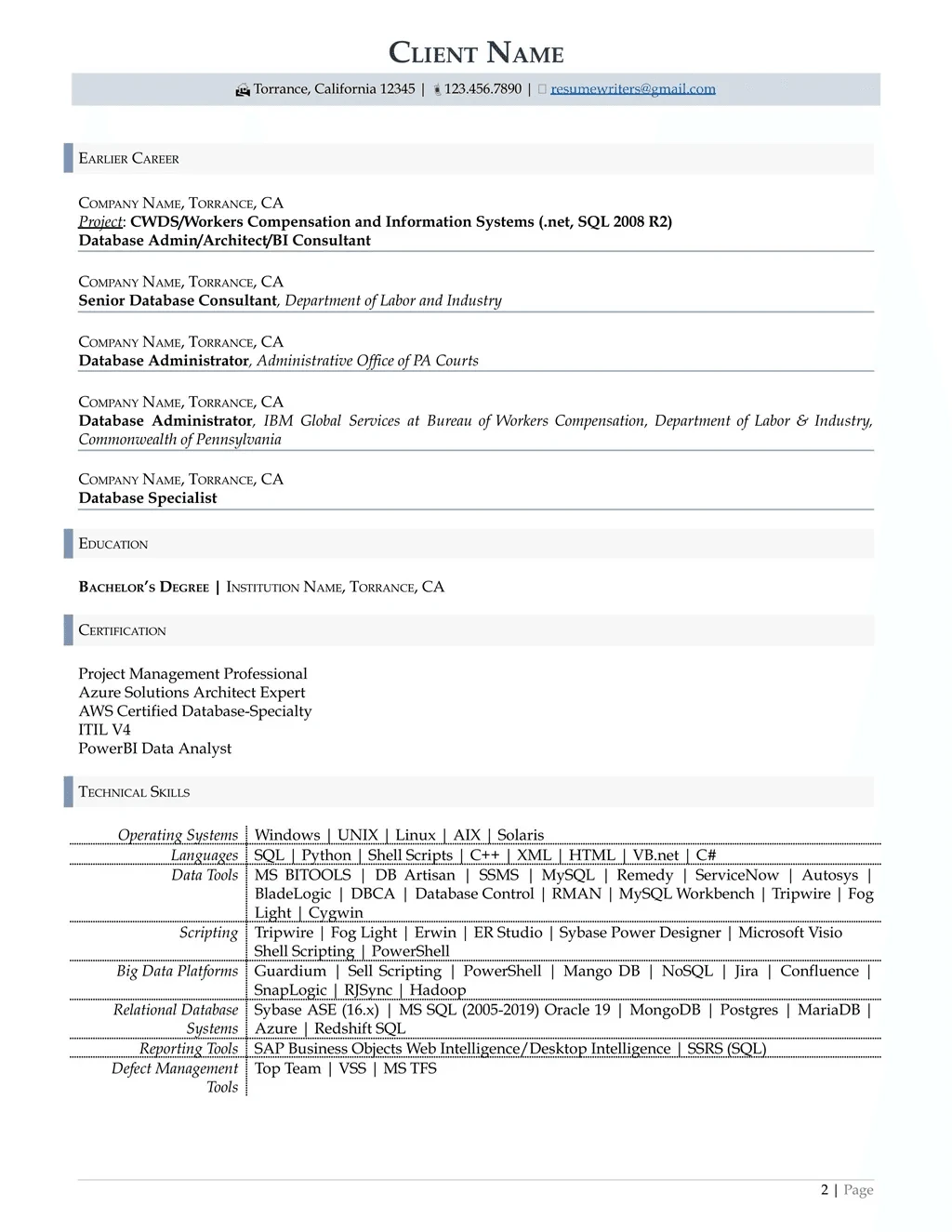As organizations harness the power of data to drive their decision-making processes, the demand for adept database developers continues to soar. If you’re aspiring to excel in this field or aiming to elevate your career, you might be aware how navigating the job market can be a daunting task, especially in a field as competitive as database development.
Fortunately, a well-crafted database developer resume becomes your key to unlocking new opportunities. This involves more than just listing your technical skills and work history. Instead, it also requires a strategic approach to highlight your accomplishments, demonstrate your problem-solving abilities, and align your experience with the specific needs of prospective employers. Your database developer resume not only serves as a snapshot of your professional journey; it also acts as a powerful marketing tool, showcasing your expertise and enticing potential employers.
In this article, we’ll delve into the essential elements of a compelling database developer resume, guiding you through the process of presenting your skills, experience, and achievements to make a lasting impression in a competitive job market. Whether you’re a seasoned database developer looking to make a career move or a recent graduate aiming to break into the industry, the insights provided here will empower you to create a resume that stands out in a sea of applicants.
What is a Database Developer?
A database developer is a professional responsible for designing, implementing, and maintaining database systems that organizations use to manage and organize their data efficiently. These experts have a deep understanding of database management systems (DBMS) and are adept at creating structures that allow for the seamless storage, retrieval, and manipulation of data.
Database developers collaborate with stakeholders, such as software developers and business analysts, to comprehend the specific data requirements of an organization. They then design and optimize databases, ensuring they are scalable, secure, and capable of handling data volumes as well as the complexity associated with modern business operations. Additionally, database developers play a crucial role in troubleshooting and optimizing database performance, ensuring data integrity, and implementing security measures to safeguard sensitive information.
In addition to their technical expertise, database developers often possess strong analytical and problem-solving skills. They are proficient in writing complex SQL queries, developing scripts, and using various database tools to manage, update, and retrieve data efficiently. As businesses increasingly rely on data-driven decision-making, the role of a database developer becomes integral in ensuring that an organization’s databases are well-structured, accessible, and aligned with the evolving needs of the business.
How Much Do Database Developers Usually Earn?
The salary of database developers can vary based on factors such as experience, location, and the specific industry they work in. On average, entry-level database developers can earn around $60,000 to $80,000 per year, while mid-level professionals with several years of experience typically command salaries ranging from $80,000 to $100,000. On the other hand, highly experienced or specialized database developers, especially those in managerial roles, can earn upwards of $120,000 annually or even more.

Top Database Developer Resume Keywords to Include in Your Resume
Incorporating the right keywords into your resume is key to catching the attention of hiring managers and passing applicant tracking systems (ATS). Utilizing specific and relevant keywords not only helps your resume pass through ATS filters but also showcases your proficiency in sought-after skills.
Here are key sections and points to strategically integrate top developer resume keywords for a compelling and impactful document.
Skills and Competencies
Ensure that your resume includes a comprehensive list of both technical and soft skills relevant to your development expertise. For example, include programming languages (e.g., Python, Java, JavaScript), specific frameworks (React, Angular), database management (SQL, MongoDB), and tools (Git, Jira). Including a mix of hard and soft skills such as problem-solving, teamwork, and communication can also provide a holistic view of your capabilities and make your resume stand out.
Action Verbs
Focus on incorporating strong verbs that convey your achievements and contributions effectively. Start each bullet point with an action verb like “designed and implemented,” “developed,” “optimized,” or “collaborated.” These verbs not only convey your active involvement in projects but also create a sense of accomplishment, showcasing your ability to drive results.
Make sure to use action verbs strategically to emphasize your role in each accomplishment and highlight your impact on projects, making your resume more targeted and engaging for prospective employers.
How to Write a Database Developer Resume?
Crafting a compelling database developer resume is essential to stand out in a competitive job market and demonstrate your expertise to potential employers. This guide outlines key strategies and tips to help you create a resume that effectively showcases your skills, experience, and accomplishments in the field of database development.
1. Start with a clear and impactful summary.
Begin your resume with a concise and impactful summary statement that provides a snapshot of your database development expertise. Clearly communicate your years of experience, key skills, and a brief overview of your career achievements. Note that this section serves as the first impression, enticing employers to delve further into your resume.
2. Tailor your resume to the job description.
Customize your resume for each application by carefully analyzing the job description. That way, you can identify and highlight specific skills, technologies, and experiences mentioned in the job posting. Tailoring your resume to align with the employer’s needs demonstrates your attentiveness and increases the likelihood of passing through ATS.
3. Showcase technical proficiency in the skills section.
Create a dedicated “Skills” section to highlight your technical prowess. Include a mix of programming languages, database management systems, frameworks, and tools relevant to database development to provide a quick overview of your capabilities, making it easier for hiring managers to identify your suitability for the role.

4. Describe your detail-oriented work experience.
In the work experience section of your resume, provide detailed descriptions of your roles, responsibilities, and accomplishments. Whenever possible, use quantifiable metrics to showcase the impact of your contributions and highlight specific projects, technologies utilized, and any efficiency improvements or problem resolutions achieved during your tenure.
5. Put light into your education and certifications earned.
Outline your relevant academic background, including degrees earned, institutions attended, and graduation dates. Additionally, showcase relevant certifications, especially those related to database development or specific technologies. These certifications add credibility to your application and demonstrate your commitment to staying current in the field.
6. Highlight any ongoing professional development initiatives.
These endeavors may include online courses, workshops, or conferences attended. Additionally, consider including a section dedicated to significant projects you’ve undertaken. Remember to provide details on your role, the technologies used, and the outcomes achieved to offer a more comprehensive view of your expertise.
7. Ensure a clean and readable formatting.
A well-structured and visually appealing resume is more likely to capture the attention of busy hiring managers. That said, opt for a clean and readable resume format by using a professional font, organized bullet points, and clear headings to enhance readability. Maintain consistency in formatting and strike a balance between text and white space.
Common Mistakes to Avoid When Writing a Database Developer Resume
Writing an effective database developer resume requires attention to detail while intently organizing elements in it. To ensure your resume effectively communicates your skills and experience, here are 10 common mistakes you must steer clear of:
- Generic Resumes — Avoid using a one-size-fits-all approach and instead tailor your resume to each job application to emphasize relevant skills and experiences.
- Overlooking Keywords — Failing to incorporate industry-specific keywords may lead to your resume being overlooked by ATS.
- Vague Summary Statements — A generic or overly brief summary can fail to capture the attention of employers, so make sure your summary provides a concise overview of your database development expertise.
- Omitting Achievements — Don’t merely list job responsibilities; highlight specific achievements, quantifying your impact to showcase the value you bring.
- Ignoring Formatting Guidelines — Disregarding formatting standards can result in a cluttered and difficult-to-read resume. Hence, maintaining a clean, professional layout with consistent fonts and bullet points is a must.
- Inaccurate or Outdated Information — Double-check your resume for accuracy, ensuring that all details, including contact information and employment dates, are current and correct.
- Lack of Metrics — Failing to include measurable metrics in your work experience may diminish the impact of your accomplishments. As a best practice, quantify results to demonstrate your contributions effectively.
- Neglecting Soft Skills — Database development isn’t solely about technical skills, so don’t forget to highlight your soft skills like communication, teamwork, and problem-solving to showcase a well-rounded profile.
- Lengthy Resumes — Keep your resume concise and focused on relevant information, as excessively long resumes may lead to disinterest from busy hiring managers.
- Overlooking Proofreading — Grammatical errors and typos can undermine your professionalism. To avoid this, proofread your resume meticulously to ensure a flawless presentation of your qualifications.
Database Developer Resume Example
Examining a well-written database developer resume can provide you invaluable insights into effective formatting, content organization, and the strategic use of keywords. Check out this sample database developer resume that you can use as a guide when writing your own:


Download this database developer resume now.
Boost Your Chances of Landing Your Target Job with an Expertly Written Resume
By implementing the strategies and insights shared in this guide, you’ve taken the crucial first step towards presenting yourself as a standout database developer. However, for those seeking an extra edge and a professionally polished document, you may consider the specialized expertise of Infotech Resume. Our writers understand the intricacies of the IT job market, ensuring that your unique skills and achievements are showcased with precision. Remember: An expertly written resume not only increases your visibility but also communicates your value proposition clearly, setting you apart in the eyes of potential employers.
For a resume that resonates and maximizes your chances of landing your target job, invest in our tailored services. Whether you’re a seasoned professional or just starting your career journey, our IT resume writing service can help elevate your application to new heights.
What are you waiting for? Take the next step toward securing your dream position by entrusting your resume to experts. Your career advancement is our priority, and with our expertise, you can confidently navigate the competitive IT job market and position yourself for success.





